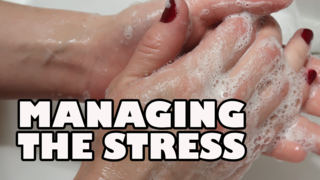Stress
7 Ways to Manage Stress During the Coronavirus Pandemic
Taking it easy when it feels like the world is on fire.
Posted March 20, 2020 Reviewed by Ekua Hagan

As I write this, I am sitting in the living room of an apartment I rented on Airbnb in Nashville, Tennessee. Two weeks ago, my family and I were here for a tango marathon when dancers from across the country flocked to the Music City for a weekend of good times, southern charm, and the warm embrace of Argentine tango. We made new friends, caught up with old ones, and left with nothing but fond memories. When we arrived at our next destination, we learned that just after we left, tornadoes ripped through Nashville and other parts of Tennessee, devastating the city we love and had enjoyed so much. A lot can happen in a day.
The coronavirus was on the news and definitely a topic of conversation, but most of the people we talked to felt optimistic. Two weeks later, and it seems to be all anyone can think about. The stores are empty, stripped clean of essential items like toilet paper and milk, and the bars and restaurants that help make this city so much fun are closed. Face masks are common, and every cough or sneeze causes momentary panic. In other countries, and even in other cities and states, citizens have been ordered to remain in their homes, and all large gatherings of people have been canceled. A lot can happen in a couple of weeks.
We are back in Nashville because of our own cancelations. My partner Sarah is a tango dancer, and I am a touring public speaker, and both of us are self-employed. We were on our way to Memphis for a series of speaking gigs when we started receiving the notifications, one after another after another until our entire tour had been canceled. We live on the road as we work, so a canceled tour also means we need to find somewhere to call home for a bit. Being just a couple of hours shy of Nashville, we decided to hole up here for a few days and plan our next steps.
To say our situation is stressful is an understatement. There are a lot of people who have it worse, but we have lost all our income for the next three months, our housing, and we have a little girl to consider as well. It is a tough spot, and yet both of us are in relatively good spirits. Neither of us has dealt with anything like this before, but we both handle stress well and remain optimistic, even when the global situation seems to get worse and worse. How do we do it?
Drugs. Lots and lots of drugs.
I am joking, of course. Sarah and I are both highly resilient people. In fact, the canceled tour was about stress management, a subject that I have been speaking to audiences about for years. I even wrote a book on the subject, The Art of Taking It Easy, and have been putting those skills to practice all my life. Sarah puts her own stress management skills to test every day by having to deal with me.
The coronavirus pandemic, and the reaction to it, may seem as if the world is on fire. Granted, I have never seen anything like this in my lifetime (which probably overlaps significantly with your lifetime), so it might be on a larger scale, but it is still just another source of stress in a long line of things that cause stress. Stress is stress regardless of the source, and the tools to manage it are the same. Allow me to share a few here.
Before I do, please note that I am discussing how we can manage our stress, anxiety, or worrisome reactions to the pandemic, not the coronavirus itself. Also, if you have been personally affected by the coronavirus, I wish you or your loved ones a healthy recovery. My goal here is to help most of us stay calm or, as I like to put it, take it easy.
1. Assess your threat level. When overwhelmed with worry or fear, it is sometimes helpful to inform yourself of the facts to assess your personal level of threat. For example, earlier in the month, I had a moment of concern and looked up the infection statistics at the time. There were about 120,000 people known to have the virus out of the nearly 8 billion people that live on this planet. Also, most of those cases were in China while my feet were planted firmly in the United States.
Digging even deeper, I found that there were only seven cases in my state and none of them in my area. I assessed my threat level as low and slept easily that night. Now, you might say, “But, Brian, what about all those people that could be spreading the virus without knowing it?” to which I’d answer that I am trying to reduce anxiety, not add to it. Once you have assessed your threat, then it is important to…
2. Identify what you can control. When we encounter stress, any stress, it is important that we ask ourselves if we can do anything about it. If there is some action we can take, then taking that action will help reduce our anxiety. For example, experts emphasize the importance of handwashing to minimize the spread of the virus. Most of us are capable of washing our hands, so wash your damn hands more often than you do.
If the experts say avoid crowded areas, then avoid crowded areas, and live with the comfort of knowing that you are doing all you can to reduce your exposure. However, what if, after a couple of weeks of social isolation, you’ve become a handwashing obsessed hermit, and you still feel anxious? Well…
3. Accept what you cannot control. Focus on what you can do, not what you can’t. There are always going to be variables that are out of your control, and that is part of what makes viruses so frightening. We can never know whether we have been in contact. We can’t control our government’s attempts at containment. We can’t control the loss of income we have experienced or the circumstances that put us back in Nashville.
Sometimes, the healthiest thing we can do is accept that there is nothing we can do. Worrying, complaining, ruminating, and wishing things were different are thoughts we will entertain, but if we focus on them too much, they’ll amplify our stress. Regarding all sorts of stress, I ask people all the time: If there is nothing you can do about it, why are you worried about it? Worrying does nothing but make the problem worse. If you are doing all you can and find that you are still overly focused on things that are outside of your control, you may want to try…
4. Actively changing negative thoughts. Did you know that the only part of your brain you have direct, voluntary control over is the part you think with? If you didn’t, that should be really great news, because it is those very thoughts that are contributing to the anxiety you may be feeling during this pandemic.
What we think influences how we feel, and I often tell people if they don’t like the way they feel to change their thoughts. So, if your brain is too frequently occupied by worries about the virus, anger about social distancing, or sorrow over lost income, then change those thoughts. Simply redirect your attention to a new subject whenever needed. Any new stimulus or activity will help change our thoughts. For example, we could listen to music, do the dishes, read a book, go for a walk, literally anything we can do will help change the channel in our head. This brings me to…
5. Staying active. One thing great about this pandemic is that it is happening during the age of the internet. We may be isolating ourselves physically, but we have an amazing opportunity to connect with others virtually.
Over the last few weeks, I have seen some incredible coping strategies as people in quarantine zones are doing what they can to stay active. I’ve seen videos of opera singers in Italy serenading their neighbors from the windows. There are tango dancers that formed the group “I’m not dancing the tango, so I am doing this instead” to share new hobbies, crafts, and other goofy pursuits. There are people who have started working out or learning to cook.
Painting, making music, or creating art, in general, can be very helpful. A lot of people I know are using this time to catch up on their reading list, and if that sounds appealing, I know a book that would make a great addition to that list. Staying active is great, but we can also work on…
6. Positive thinking. Remember earlier when I mentioned the only part of your brain you have voluntary control over is the part you think with? Another thing worth noting is that you can only hold a few thoughts in mind at any given time. So, if you are having positive, optimistic thoughts, there isn’t much room left for dwelling on negativity.
Monty Python once sang “Always Look on the Bright Side of Life,” and while it may have been played for laughs, but there is truth there. Positive thinking and optimism help us pull through. Not to sound like a blind optimist, but things will absolutely get better. And, speaking of playing things for laughs, don't forget about…
7. Humor. My seminars on stress management are popular because I use a lot of humor in my presentations. In fact, humor is a natural stress-management tool. Coping with and minimizing stress is what humor is for. Laughter relieves anxiety, lowers stress hormones, and helps us to calm down. I can’t tell you how to find humor in your situation, but as much as we can, we need to laugh and just take it easy.
So, work from home if you can, avoid crowds, wash your hands, and try to keep your mind off of the negativity as we all wait this one out. As for us, in the morning, we will be packing up and making our way to stay with family for the next month or so. I don’t know when or if we will be able to tour again, but I am sure we will be OK. Today we hung out with our friend Shawn, who lives in Nashville. Keeping with the protocol of social distancing, Sarah and I refused to talk to him.




